外研版高考英语选修6 Module 6《War and Peace》word教案
- 格式:doc
- 大小:4.52 MB
- 文档页数:39
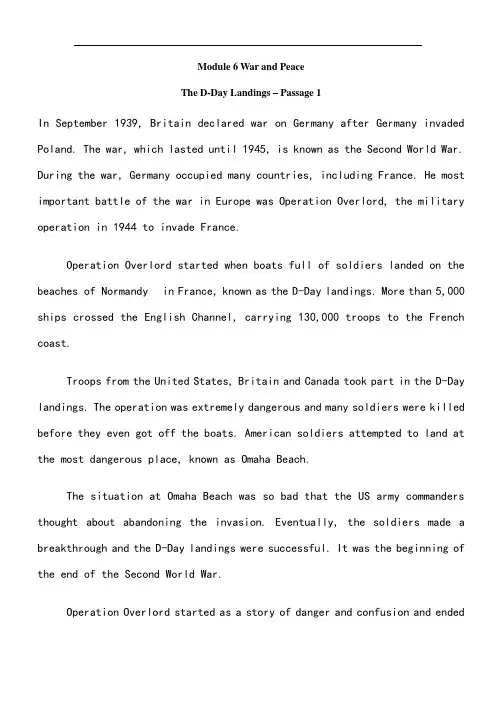
Module 6 War and PeaceThe D-Day Landings – Passage 1In September 1939, Britain declared war on Germany after Germany invaded Poland. The war, which lasted until 1945, is known as the Second World War. During the war, Germany occupied many countries, including France. He most important battle of the war in Europe was Operation Overlord, the military operation in 1944 to invade France.Operation Overlord started when boats full of soldiers landed on the beaches of Normandy in France, known as the D-Day landings. More than 5,000 ships crossed the English Channel, carrying 130,000 troops to the French coast.Troops from the United States, Britain and Canada took part in the D-Day landings. The operation was extremely dangerous and many soldiers were killed before they even got off the boats. American soldiers attempted to land at the most dangerous place, known as Omaha Beach.The situation at Omaha Beach was so bad that the US army commanders thought about abandoning the invasion. Eventually, the soldiers made a breakthrough and the D-Day landings were successful. It was the beginning of the end of the Second World War.Operation Overlord started as a story of danger and confusion and endedas a story of bravery and acts of heroism.The D-Day Landings – Passage 2The soldiers of Able Company crossed the English Channel in seven boats early on the morning of 6 June 1944. when they were about 5 kilometres from the beach, the Germans started firing artillery shells at them but the boats were too far away. The Germans continued firing and Boat 5 was hit one kilometer from the beach. Six men drowned before help arrived. Twenty men fell into the water and were picked up by other boats. As a result, they missed the fighting on the beach. Six men drowned before help arrived. Twenty men fell into the water and were picked up by other boats. As a result, they missed the fighting on the beach. They were lucky. If they had reached the beach, they would probably have been killed.When Boat 3 was a few metres form the beach, the soldiers jumped out, but the water was so deep that some of them disappeared under the water. Many of the men were either killed or wounded by machine gun fire.The soldiers on Boat 1 and Boat 4 jumped into the water, but it was too deep and most of them drowned. Half an hour after the first attack, two thirds of the company (a company is a group of about 100 soldiers) were dead. The survivors lay on the beach, exhausted and shocked.After an hour and forty-five minutes, six of the survivors tried to climb up the cliff to get off the beach. Four were too exhausted to reach the top. The other two, Private Jake Shefer and Private Thomas Lovejoy, joined a group from another company and fought with them. Two men. Two rifles. This was Able Company’s contribution to D-Day.The D-Day Landings – Passage 3On 6 June 2004, survivors of the D-Day landings from many different countries returned to France to remember their lost comrades. Many of them went to the cemetery and memorial which overlooks Omaha Beach.The cemetery and memorial are situated on a cliff overlooking the beach and the English Channel, from where the boats attempted their landing. The cemetery contains the graves of 9,386 Americans who died during the landings. The memorial also contains the names of more than 1,500 men who were never found.On the memorial, there is part of a poem called “For the Fallen”, which was written by an English poet, Lawrence Binyon:They shall not grow old, as we that are left grow old. Age shall not weary them, nor the years condemn. At the going down of the sun and in the morning we will remember them.The poem was first published in The Times newspaper on 14 September 1914 and can be seen on war memorials in many parts of the world.Saving Private Ryan (1998)A review by Jenny Carter, aged 15Saving Private Ryan is a film which was directed by Steven Spielberg. The two main characters are Captain John Miller, played by Tom Hanks, and Private James Ryan, played by Matt Damon.James Ryan is the fourth brother to be involved in the Second World War. His three brothers have already been killed, two of them in the D-Day landings in Normandy, the other in a battle in another part of the world. Their heart-broken mother receives news about all her dead sons on the same day. The US army decides to send a group of men into the French countryside to try to find the fourth brother. Captain Miller, a hero and survivor of the Omaha Beach battle, is chosen to lead the rescue team of eight men.The film opens with a 30-minute sequence of the invasion of Normandy, probably the most violent images of war ever shown in a film. We see the full horror of war, and the chaos and senseless waste of life.Saving Private Ryan is an unforgettable anti-war film and also a storyof courage and sacrifice. Spielberg has made a lot of good films, but he has never made one with such a strong message. And the message is simple – we want peace; we don’t want war.D-Day + 2To our astonishment, just two days after we had received our confidential orders to join the D-Day landing troops, and after a day fighting and seeing many of my friends killed by the enemy, we found ourselves outside a peaceful village in France. It was so sudden, after the mess and confusion of war on the beach.It was late afternoon, and the sun was setting on a perfect country scene of farm buildings, a main street, a few shops, a garage and a church. But we hesitated because we were aware that there might still have been enemy soldiers. Our lieutenant told Private Kowalski and me to advance and check the village. As we entered the main street, a young woman on a tractor drove out of the garage, saw us and called out something in French. Immediately five men came out of the bar, and two more from a farmyard, holding guns. I took off my helmet and yelled, “American! Put your guns down!” they gathered round us, shouting and shaking our hands, some women appeared and kissed us.We soon understood that the enemy had abandoned the village, so Kowalskiwent back to the others to let them know it was safe. I walked into a barbershop and stroked my chin, to show I needed to shave. The barber had a magnificent moustache, which he used wax to keep in shape. He filled a tin with cold water, and took out a razor from a drawer. He used a leather sharpener on the razor, and then gave me the best shave I had had in years. Finally he picked up a pair of scissors and a comb, and cut my hair.When the rest of our company arrived, they unloaded their baggage and bedding while the villagers brought out some jars of wine, and laid a table in the middle of the street, which they then covered with plates of potatoes and carrots, ham and sausages. Someone shouted “Cheers!” in English and we all drank to liberation and to the French constitution. Some of our boys had never tasted wine before, and spat it out, thinking it was vinegar.We gave stockings to the women, which they loved, and in return, they gave us perfume for our girlfriends. I was too ashamed to admit that I was too young to have a girlfriend. But the villagers treated us like heroes, and for a brief moment, I felt that all the fear and danger had been worthwhile. But I also remembered my fiends who had died earlier that day, and wondered if they would have agreed.Winston Churchill’s SpeechesWinston Churchill is well-known as a statesman, politician and as the British Prime Minister during most of the Second World War. He is especially famous for his speeches which many believe made people even more determined to defeat the enemy. Many of these speeches contained lines which are remembered even today.Churchill made one of his greatest speeches in 1940, when he was invited to become Prime Minister of Britain, and the leader of a new government. The country had been at war for over eight months, and he knew that it would suffer many great defeats before it would begin to win the war. So on 13 May 1940 he promised the House of Commons: “I would say to the House, as I said to those who have joined the Government, ‘I have nothing to offer but blood, toil, tears and sweat.’”A month later, the Germany army had advanced across northern Europe, and the British Army had retreated to the coast of the English Channel. The only escape was to cross the sea back to England. Hundreds of small boats set out from ports on the English coast to bring back the soldiers from the beaches of Dunkirk in France. But Churchill encouraged people that this was only a tempor ary defeat in a speech which included the words, “We shall fight on the beaches, we shall fight on the landing grounds, we shall fight in the fields and in the streets. We shall fight in the hills; we shall never surrender.” On 18 June 1940, Churchill gave another fine speech when he drew attentionto the courage of everyone defending Britain. “In years to come,” he said, “…men will say, ‘This was their finest hour.’”The Germans continued their attacks on Britain from the air. A small number of pilots resisted the much larger German Air Force. Germany lost many airplanes, and was forced to change their strategy. Britain was no longer threatened by an early invasion, and on 20 August 1940, he said, “Never in the filed of human conflict was so much owed by so many to so few.”In two years, Germany began to lose some important battles. After a defeat in North Africa, on 10 November 1942 he made a speech with the famous words, “Now this is not the end. It is not even the beginning of the end. But is is, perhaps, the end of the beginning.”Many people believe that Churchill’s leadership inspired people to remain brave in the face of Nazi Germany. His speeches are still remembered and quoted today, and remain some of the finest examples of spoken English.How the United Nations Tries to Keep the PeaceIf you see soldiers wearing sky-blue helmets, they are United Nations peacekeepers. The idea of UN peacekeepers began more than 60 years ago. They were the idea of Canadian Foreign Minister Lester Pearson, who won the Nobel Peace Prize for his work.The first UN peacekeepers were sent to the Middle East in 1948. They only went to see what was happening, and were not armed. The first armed UN peacekeepers were sent to the Middle East in 1957 when there was a disagreement between the British and Egyptian governments about the Suez Canal.Since then, there have been more than 50 UN peacekeeping operations, many of them since the year 2000. In 2003, there were fifteen, involving nearly 37,000 personnel (soldiers and civilians).UN peacekeepers have included soldiers and other personnel from more than 120 countries. Since 2000, most of the personnel have come from Pakistan, Bangladesh, India and Ghana. There have also been soldiers from China, Sweden, Denmark, Norway, Finland, Canada, Ireland, Italy and Australia. During the 1990s, eastern European countries such as Poland and the Czech Republic also sent personnel.There have been many UN peacekeeping successes, but also some failures. The UN couldn’t stop a terrible civil war in the African state of Rwanda in 1995, despite warnings of the dangers from nearby states.。
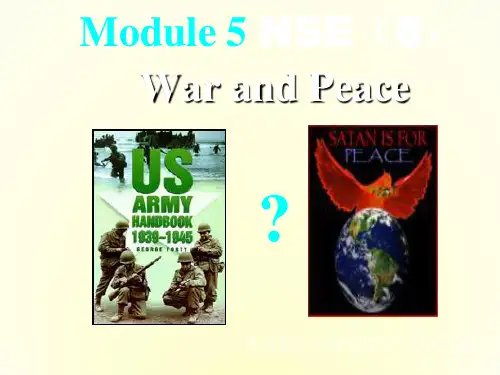
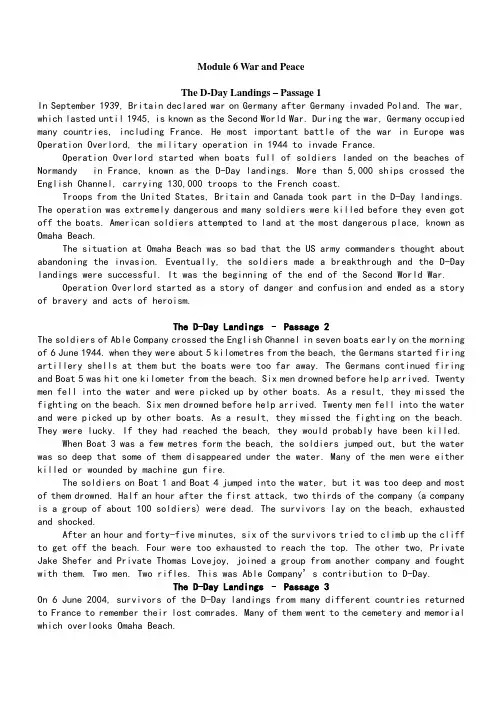
Module 6 War and PeaceThe D-Day Landings – Passage 1In September 1939, Britain declared war on Germany after Germany invaded Poland. The war, which lasted until 1945, is known as the Second World War. During the war, Germany occupied many countries, including France. He most important battle of the war in Europe was Operation Overlord, the military operation in 1944 to invade France.Operation Overlord started when boats full of soldiers landed on the beaches of Normandy in France, known as the D-Day landings. More than 5,000 ships crossed the English Channel, carrying 130,000 troops to the French coast.Troops from the United States, Britain and Canada took part in the D-Day landings. The operation was extremely dangerous and many soldiers were killed before they even got off the boats. American soldiers attempted to land at the most dangerous place, known as Omaha Beach.The situation at Omaha Beach was so bad that the US army commanders thought about abandoning the invasion. Eventually, the soldiers made a breakthrough and the D-Day landings were successful. It was the beginning of the end of the Second World War.Operation Overlord started as a story of danger and confusion and ended as a story of bravery and acts of heroism.The D-Day Landings – Passage 2The soldiers of Able Company crossed the English Channel in seven boats early on the morning of 6 June 1944. when they were about 5 kilometres from the beach, the Germans started firing artillery shells at them but the boats were too far away. The Germans continued firing and Boat 5 was hit one kilometer from the beach. Six men drowned before help arrived. Twenty men fell into the water and were picked up by other boats. As a result, they missed the fighting on the beach. Six men drowned before help arrived. Twenty men fell into the water and were picked up by other boats. As a result, they missed the fighting on the beach. They were lucky. If they had reached the beach, they would probably have been killed. When Boat 3 was a few metres form the beach, the soldiers jumped out, but the water was so deep that some of them disappeared under the water. Many of the men were either killed or wounded by machine gun fire.The soldiers on Boat 1 and Boat 4 jumped into the water, but it was too deep and most of them drowned. Half an hour after the first attack, two thirds of the company (a company is a group of about 100 soldiers) were dead. The survivors lay on the beach, exhausted and shocked.After an hour and forty-five minutes, six of the survivors tried to climb up the cliff to get off the beach. Four were too exhausted to reach the top. The other two, Private Jake Shefer and Private Thomas Lovejoy, joined a group from another company and fought with them. Two men. Two rifl es. This was Able Company’s contribution to D-Day.The D-Day Landings – Passage 3On 6 June 2004, survivors of the D-Day landings from many different countries returned to France to remember their lost comrades. Many of them went to the cemetery and memorial which overlooks Omaha Beach.The cemetery and memorial are situated on a cliff overlooking the beach and the English Channel, from where the boats attempted their landing. The cemetery contains the graves of 9,386 Americans who died during the landings. The memorial also contains the names of more than 1,500 men who were never found.On the memorial, there is part of a poem called “For the Fallen”, which was written by an English poet, Lawrence Binyon:They shall not grow old, as we that are left grow old. Age shall not weary them, nor the years condemn. At the going down of the sun and in the morning we will remember them. The poem was first published in The Times newspaper on 14 September 1914 and can be seen on war memorials in many parts of the world.Saving Private Ryan (1998)A review by Jenny Carter, aged 15Saving Private Ryan is a film which was directed by Steven Spielberg. The two main characters are Captain John Miller, played by Tom Hanks, and Private James Ryan, played by Matt Damon.James Ryan is the fourth brother to be involved in the Second World War. His three brothers have already been killed, two of them in the D-Day landings in Normandy, the other in a battle in another part of the world. Their heart-broken mother receives news about all her dead sons on the same day. The US army decides to send a group of men into the French countryside to try to find the fourth brother. Captain Miller, a hero and survivor of the Omaha Beach battle, is chosen to lead the rescue team of eight men.The film opens with a 30-minute sequence of the invasion of Normandy, probably the most violent images of war ever shown in a film. We see the full horror of war, and the chaos and senseless waste of life.Saving Private Ryan is an unforgettable anti-war film and also a story of courage and sacrifice. Spielberg has made a lot of good films, but he has never made one with such a strong message. And the message is simple –we want peace; we don’t want war.D-Day + 2To our astonishment, just two days after we had received our confidential orders to join the D-Day landing troops, and after a day fighting and seeing many of my friends killed by the enemy, we found ourselves outside a peaceful village in France. It was so sudden, after the mess and confusion of war on the beach.It was late afternoon, and the sun was setting on a perfect country scene of farm buildings, a main street, a few shops, a garage and a church. But we hesitated because we were aware that there might still have been enemy soldiers. Our lieutenant told Private Kowalski and me to advance and check the village.As we entered the main street, a young woman on a tractor drove out of the garage, saw us and called out something in French. Immediately five men came out of the bar, and two more from a farmyard, holding guns. I took off my helmet and yelled, “American! Put your guns down!” they gathered round us, shouting and shaking our hands, some women appeared and kissed us.We soon understood that the enemy had abandoned the village, so Kowalski went backto the others to let them know it was safe. I walked into a barbershop and stroked my chin, to show I needed to shave. The barber had a magnificent moustache, which he used wax to keep in shape. He filled a tin with cold water, and took out a razor from a drawer. He used a leather sharpener on the razor, and then gave me the best shave I had had in years. Finally he picked up a pair of scissors and a comb, and cut my hair.When the rest of our company arrived, they unloaded their baggage and bedding while the villagers brought out some jars of wine, and laid a table in the middle of the street, which they then covered with plates of potatoes and carrots, ham and sausages. Someone shouted “Cheers!” in English and we all drank to liberation and to the French constitution. Some of our boys had never tasted wine before, and spat it out, thinking it was vinegar. We gave stockings to the women, which they loved, and in return, they gave us perfume for our girlfriends. I was too ashamed to admit that I was too young to have a girlfriend. But the villagers treated us like heroes, and for a brief moment, I felt that all the fear and danger had been worthwhile. But I also remembered my fiends who had died earlier that day, and wondered if they would have agreed.Winston Churchill’s SpeechesWinston Churchill is well-known as a statesman, politician and as the British Prime Minister during most of the Second World War. He is especially famous for his speeches which many believe made people even more determined to defeat the enemy. Many of these speeches contained lines which are remembered even today.Churchill made one of his greatest speeches in 1940, when he was invited to become Prime Minister of Britain, and the leader of a new government. The country had been at war for over eight months, and he knew that it would suffer many great defeats before it would begin to win the war. So on 13 May 1940 he promised the House of Commons: “I would say to the House, as I said to those who have joined the Government, ‘I have nothing to offer but blood, toil, tears and sweat.’”A month later, the Germany army had advanced across northern Europe, and the British Army had retreated to the coast of the English Channel. The only escape was to cross the sea back to England. Hundreds of small boats set out from ports on the English coast to bring back the soldiers from the beaches of Dunkirk in France. But Churchill encouraged people that this was only a tempor ary defeat in a speech which included the words, “We shall fight on the beaches, we shall fight on the landing grounds, we shall fight in the fields and in the streets. We shall fight in the hills; we shall never surrender.”On 18 June 1940, Churchill gave another fine speech when he drew attention to the courage of everyone defending Britain. “In years to come,” he said, “…men will say, ‘This was their finest hour.’”The Germans continued their attacks on Britain from the air. A small number of pilots resisted the much larger German Air Force. Germany lost many airplanes, and was forced to change their strategy. Britain was no longer threatened by an early invasion, and on 20 August 1940, he said, “Never in the filed of human conflict was so much owed by so many to so few.”In two years, Germany began to lose some important battles. After a defeat in North Africa, on 10 November 1942 he made a speech with the famous words, “Now this is not theend. It is not even the beginning of the end. But is is, perhaps, the end of the beginning.”Many people believe that Churchill’s leadership inspired people to remain brave in the face of Nazi Germany. His speeches are still remembered and quoted today, and remain some of the finest examples of spoken English.How the United Nations Tries to Keep the PeaceIf you see soldiers wearing sky-blue helmets, they are United Nations peacekeepers. The idea of UN peacekeepers began more than 60 years ago. They were the idea of Canadian Foreign Minister Lester Pearson, who won the Nobel Peace Prize for his work.The first UN peacekeepers were sent to the Middle East in 1948. They only went to see what was happening, and were not armed. The first armed UN peacekeepers were sent to the Middle East in 1957 when there was a disagreement between the British and Egyptian governments about the Suez Canal.Since then, there have been more than 50 UN peacekeeping operations, many of them since the year 2000. In 2003, there were fifteen, involving nearly 37,000 personnel (soldiers and civilians).UN peacekeepers have included soldiers and other personnel from more than 120 countries. Since 2000, most of the personnel have come from Pakistan, Bangladesh, India and Ghana. There have also been soldiers from China, Sweden, Denmark, Norway, Finland, Canada, Ireland, Italy and Australia. During the 1990s, eastern European countries such as Poland and the Czech Republic also sent personnel.There have been many UN peacekeeping successes, but also some failures. The UN couldn’t stop a terrible civil war in the African state of Rwanda in 1995, despite warnings of the dangers from nearby states.。
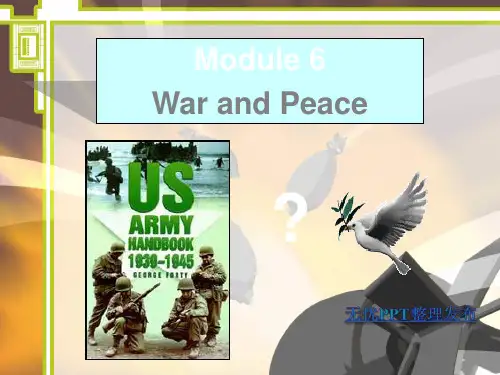
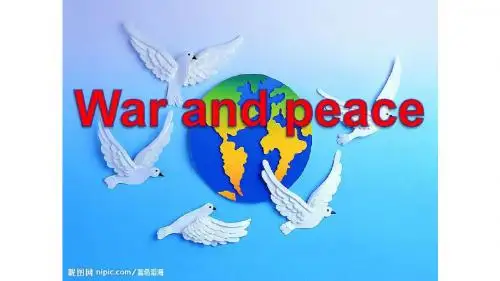
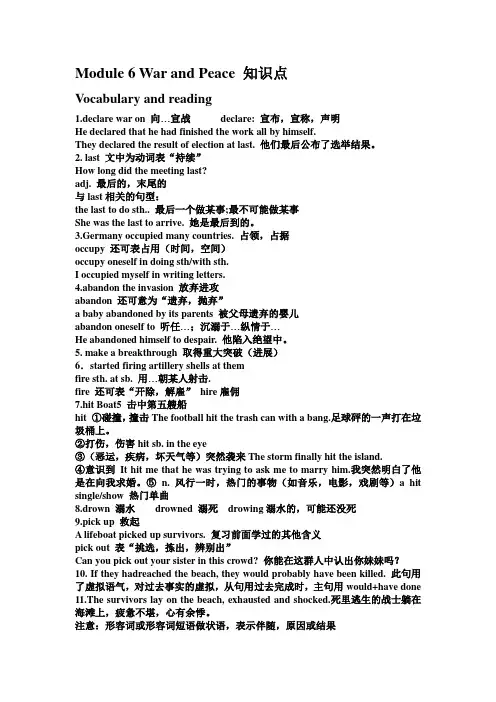
Module 6 War and Peace 知识点Vocabulary and reading1.declare war on 向…宣战declare: 宣布,宣称,声明He declared that he had finished the work all by himself.They declared the result of election at last. 他们最后公布了选举结果。
2. last 文中为动词表“持续”How long did the meeting last?adj. 最后的,末尾的与last相关的句型:the last to do sth.. 最后一个做某事;最不可能做某事She was the last to arrive. 她是最后到的。
3.Germany occupied many countries. 占领,占据occupy 还可表占用(时间,空间)occupy oneself in doing sth/with sth.I occupied myself in writing letters.4.abandon the invasion 放弃进攻abandon 还可意为“遗弃,抛弃”a baby abandoned by its parents 被父母遗弃的婴儿abandon oneself to 听任…;沉溺于…纵情于…He abandoned himself to despair. 他陷入绝望中。
5. make a breakthrough 取得重大突破(进展)6.started firing artillery shells at themfire sth. at sb. 用…朝某人射击.fire 还可表“开除,解雇”hire雇佣7.hit Boat5 击中第五艘船hit ①碰撞,撞击The football hit the trash can with a bang.足球砰的一声打在垃圾桶上。
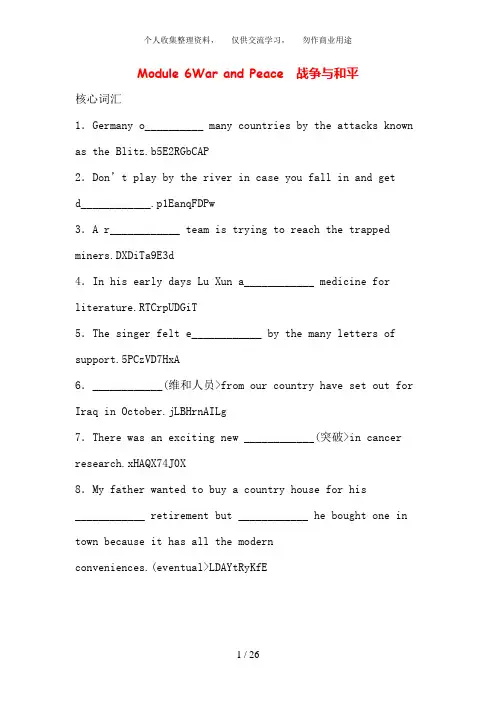
Module 6War and Peace战争与和平核心词汇1.Germany o__________ many countries by the attacks known as the Blitz.b5E2RGbCAP2.Don’t play by the river in case you fall in and get d____________.p1EanqFDPw3.A r____________ team is trying to reach the trapped miners.DXDiTa9E3d4.In his early days Lu Xun a____________ medicine for literature.RTCrpUDGiT5.The singer felt e____________ by the many letters of support.5PCzVD7HxA6.____________(维和人员>from our country have set out for Iraq in October.jLBHrnAILg7.There was an exciting new ____________(突破>in cancer research.xHAQX74J0X8.My father wanted to buy a country house for his ____________ retirement but ____________ he bought one in town because it has all the modern conveniences.(eventual>LDAYtRyKfE9.At first he ____________ to my plan but then he changed his mind and ____________ to it.His ____________ made me very angry.(agree>Zzz6ZB2Ltk10.The doctors are ____________ on an ____________ of a factory who got injured when ____________ a machine,and the ____________ is said to last over one hour.(operation>dvzfvkwMI11.occupied2.drowned3.rescue4.abandoned,5.encouraged6.Peacek eepers7.breakthrough8.eventual;eventually9.agreed;disagreed;disagreement,10.operating;operator;operating;operationrqyn14ZNXI高频短语1.________________ 向……宣战2.________________ 取得重大突破(进展>3.________________ 停下来让某人搭车(船等>;救起4.________________ 卷入,陷入5.________________ 收获,进入6.________________ 考虑,思考7.________________ 令某人惊讶的是8.________________ 位于,坐落于9.________________ 为……干杯,祝酒10.________________ 注意11.________________ 在视野中12.________________ 提及,参考1.declare war on2.make a breakthrough3.pick up,4.be involved in5.get in6.think about7.to one’s astonishment8.be situated on9.drink to10.draw attention to 11.in view 12.refer toEmxvxOtOco重点句式1.The war,________________,is known as the Second World War.SixE2yXPq5这场战争一直持续到1945年,被称为第二次世界大战。
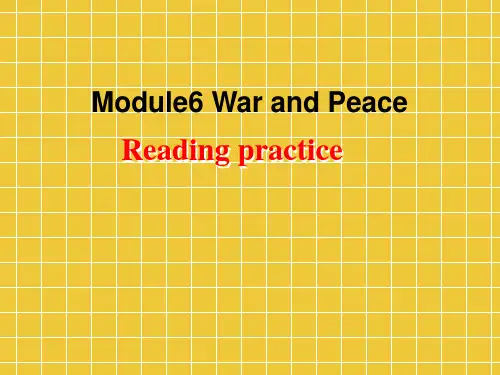
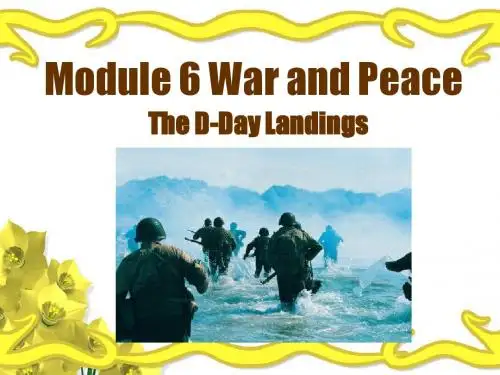
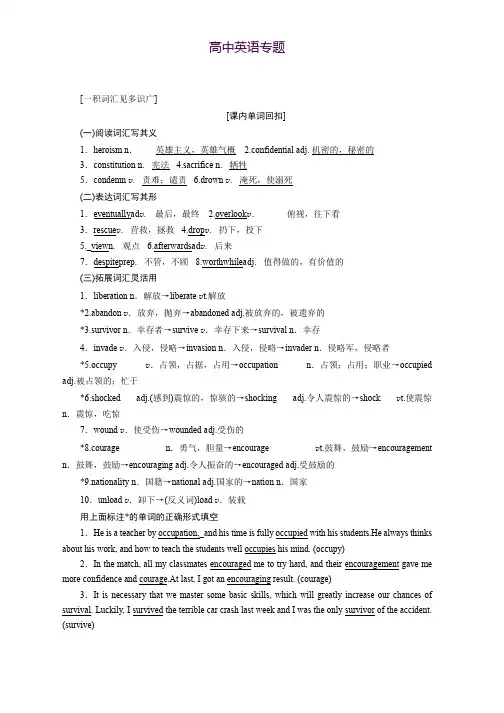
[一积词汇见多识广][课内单词回扣](一)阅读词汇写其义1.heroism n.英雄主义,英雄气概 2.confidential adj. 机密的,秘密的3.constitution n. 宪法 4.sacrifice n. 牺牲5.condemn v. 责难;谴责 6.drown v. 淹死,使溺死(二)表达词汇写其形1.eventually ad v. 最后,最终 2.overlook v.俯视,往下看3.rescue v. 营救,拯救 4.drop v. 扔下,投下5._view n. 观点6.afterwards ad v. 后来7.despite prep. 不管,不顾8.worthwhile adj. 值得做的,有价值的(三)拓展词汇灵活用1.liberation n.解放→liberate v t.解放*2.abandon v.放弃,抛弃→abandoned adj.被放弃的,被遗弃的*3.survivor n.幸存者→survive v.幸存下来→survival n.幸存4.invade v.入侵,侵略→invasion n.入侵,侵略→invader n.侵略军,侵略者*5.occupy v.占领,占据,占用→occupation n.占领;占用;职业→occupied adj.被占领的;忙于*6.shocked adj.(感到)震惊的,惊骇的→shocking adj.令人震惊的→shock v t.使震惊n.震惊,吃惊7.wound v.使受伤→wounded adj.受伤的*8.courage n.勇气,胆量→encourage v t.鼓舞,鼓励→encouragement n.鼓舞,鼓励→encouraging adj.令人振奋的→encouraged adj.受鼓励的*9.nationality n.国籍→national adj.国家的→nation n.国家10.unload v.卸下→(反义词)load v.装载用上面标注*的单词的正确形式填空1.He is a teacher by occupation,_and his time is fully occupied with his students.He always thinks about his work, and how to teach the students well occupies his mind. (occupy)2.In the match, all my classmates encouraged me to try hard, and their encouragement gave me more confidence and courage.At last, I got an encouraging result. (courage)3.It is necessary that we master some basic skills, which will greatly increase our chances of survival. Luckily, I survived the terrible car crash last week and I was the only survivor of the accident. (survive)4.One winter morning we came across an abandoned puppy on the street. I wondered who it was that abandoned such a cute puppy. (abandon)5.We were shocked at the shocking news that he died yesterday. (shock)6.Britain is a developed nation and its national flower is rose. Many people dream of having British nationality.(nation)[话题单词积累]1.dynasty/'dInəstI/n.朝代2.emperor/'emp(ə)rə /n. 皇帝3.queen/kwiːn/n. 女王,王后4.slavery/'sleIv(ə)rI/n. 奴隶制度5.battle/'bæt(ə)l/n. 战斗;战役6.conflict/'kɒnflIkt/n. 冲突7.origin/'ɒrIdʒIn/n. 起源;由来8.weapon/'wep(ə)n/n. 武器9.aggression/ə'ɡreʃ(ə)n/n. 侵略10.revolution/revə'luːʃ(ə)n/n. 革命11.uprising/'ʌpraIzIŋ/n. 起义12.incident/'InsId(ə)nt/n. 事变13.disaster/dI'zɑːstə/n. 灾难14.poverty/'pɒvətI/n. 贫穷15.violence/'vaIəl(ə)ns/n. 暴力16.sorrow/'sɒrəʊ/n. 痛苦17.ignore/Iɡ'nɔː/v. 忽视,不顾18.unite/juː'naIt/v. 联合,团结19.launch/lɔːntʃ/v. 发动;发射20.betray/bI'treI/v t. 出卖,泄露(机密)21.escape/I'skeIp/v i. 逃跑;逃走22.historic/hI'stɒrIk/adj. 历史上著名的23.historical/hI'stɒrIk(ə)l/adj. 与历史有关的24.empire/'empaIə/n. 帝国25.kingdom/'kIŋdəm/n. 王国26.president/'prezId(ə)nt/n. 总统27.religion/rI'lIdʒ(ə)n/n. 宗教28.religious/rI'lIdʒəs/adj. 宗教的29.peace-loving/'piːslʌviŋ/adj. 爱好和平的30.racial/'reIʃ(ə)l/adj. 种族的31.attack/ə'tæk/v t.& n. 进攻,攻击32.explode/Ik'spləʊd/v i. 爆炸33.abolish/ə'bɒlIʃ/v t. 废除;取消34.immigrant/'ImIɡr(ə)nt/n. 移民35.independence/IndI'pend(ə)ns/n.独立[二积短语顿挫抑扬][课内短语回扣](一)根据汉语写出下列短语*1.be_involved_in 卷入,陷入;涉及*2.to_one's_astonishment 令某人惊讶的是3.drink_to 为……干杯*4.declare_war_on 向……宣战*5.make_a_breakthrough 取得重大突破(进展)*6.pick_up 停下来让某人搭车(船等);(偶然)学会7.draw_attention_to 引起注意*8.refer_to 提及;参考;查阅;指的是(二)用上面标注*的短语完成下列句子1.Although he didn't mention any name, everyone knew who he was referring_to.2.She picked_up a lot of French when she was in France.3.After the Japanese bombed Pearl Harbor on December 7, 1941, the U.S.declared_war_on Japan and Germany.4.As we all know, Chinese scientists have made_a_breakthrough in the aerospace.5.To_my_astonishment,_they arrived on time despite the fact that they started off two days late.6.If you are_involved_in an accident, you are required to remain at the scene until the officer lets you go.[话题短语积累]1.in peace 和平2.at war 交战3.turn against 背叛4.serve in the army 服役5.defend ...against ... 防御……6.devote ...to ... 把……奉献给……7.the First World War 第一次世界大战8.break out 爆发9.in memory of ... 为了纪念……10.have a history of ... 有……的历史11.vote for/against 投票支持/反对12.on behalf of 代表13.come to power 上台执政14.in the long run 从长远来看15.for the benefit of 为了……的利益16.lose one's life 丧生[三积句式写作扮靓][课内句式仿写]1.before引导时间状语从句,表示“还没来得及……就……”[例句] The operation was extremely dangerous and many soldiers were killed before they even got off the boats.[仿写] 我还没来得及告诉他火车什么时候到,他就匆忙离开奔向火车站了。
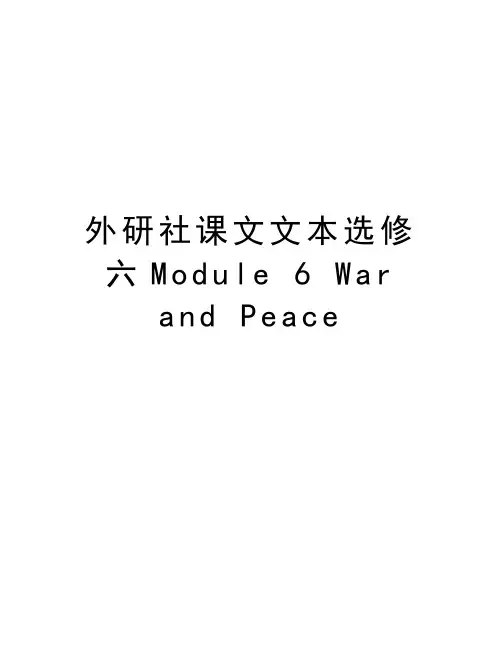
外研社课文文本选修六M o d u l e6W a ra n d P e a c eModule 6 War and PeaceThe D-Day Landings – Passage 1In September 1939, Britain declared war on Germany after Germany invaded Poland. The war, which lasted until 1945, is known as the Second World War. During the war, Germany occupied many countries, including France. He most important battle of the war in Europe was Operation Overlord, the military operation in 1944 to invade France.Operation Overlord started when boats full of soldiers landed on the beaches of Normandy in France, known as the D-Day landings. More than 5,000 ships crossed the English Channel, carrying 130,000 troops to the French coast.Troops from the United States, Britain and Canada took part in the D-Day landings. The operation was extremely dangerous and many soldiers were killed before they even got off the boats. American soldiers attempted to land at the most dangerous place, known as Omaha Beach.The situation at Omaha Beach was so bad that the US army commanders thought about abandoning the invasion. Eventually, the soldiers made a breakthrough and the D-Day landings were successful. It was the beginning of the end of the Second World War.Operation Overlord started as a story of danger and confusion and ended as a story of bravery and acts of heroism.The D-Day Landings – Passage 2The soldiers of Able Company crossed the English Channel in seven boats early on the morning of 6 June 1944. when they were about 5 kilometres from the beach, the Germans started firing artillery shells at them but the boats were too far away. The Germans continued firing and Boat 5 was hit one kilometer from the beach. Six men drowned before help arrived. Twenty men fell into the water and were picked up by other boats. As a result, they missed the fighting on the beach. Six men drowned before help arrived. Twenty men fell into the water and were picked up by other boats. As a result, they missed the fighting on the beach. They were lucky. If they had reached the beach, they would probably have been killed.When Boat 3 was a few metres form the beach, the soldiers jumped out, but the water was so deep that some of them disappeared under the water. Many of the men were either killed or wounded by machine gun fire.The soldiers on Boat 1 and Boat 4 jumped into the water, but it was too deep and most of them drowned. Half an hour after the first attack, two thirds of the company (a company is a group of about 100 soldiers) were dead. The survivors lay on the beach, exhausted and shocked.After an hour and forty-five minutes, six of the survivors tried to climb up the cliff to get off the beach. Four were too exhausted to reach the top. The other two, Private Jake Shefer and Private Thomas Lovejoy, joined a group from another company and fought with them. Two men. Two rifles. This was Able Company’s contribution to D-Day.The D-Day Landings – Passage 3On 6 June 2004, survivors of the D-Day landings from many different countries returned to France to remember their lost comrades. Many of them went to the cemetery and memorial which overlooks Omaha Beach.The cemetery and memorial are situated on a cliff overlooking the beach and the English Channel, from where the boats attempted their landing. The cemetery contains the graves of 9,386 Americans who died during the landings. The memorial also contains the names of more than 1,500 men who were never found.On the memorial, there is part of a poem called “For the Fallen”, which was written by an English poet, Lawrence Binyon:They shall not grow old, as we that are left grow old. Age shall not weary them, nor the years condemn.At the going down of the sun and in the morning we will remember them.The poem was first published in The Times newspaper on 14 September 1914 and can be seen on war memorials in many parts of the world.Saving Private Ryan (1998)A review by Jenny Carter, aged 15Saving Private Ryan is a film which was directed by Steven Spielberg. The two main characters are Captain John Miller, played by Tom Hanks, and Private James Ryan, played by Matt Damon.James Ryan is the fourth brother to be involved in the Second World War. His three brothers have already been killed, two of them in the D-Day landings in Normandy, the other in a battle in another part of the world. Their heart-broken mother receives news about all her dead sons on the same day. The US army decides to send a group of men into the French countryside to try to find the fourth brother. Captain Miller, a hero and survivor of the Omaha Beach battle, is chosen to lead the rescue team of eight men.The film opens with a 30-minute sequence of the invasion of Normandy, probably the most violent images of war ever shown in a film. We see the full horror of war, and the chaos and senseless waste of life. Saving Private Ryan is an unforgettable anti-war film and also a story of courage and sacrifice. Spielberg has made a lot of good films, but he has never made one with such a strong message. And the message is simple – we want peace; we don’t want war.D-Day + 2To our astonishment, just two days after we had received our confidential orders to join the D-Day landing troops, and after a day fighting and seeing many of my friends killed by the enemy, we found ourselves outside a peaceful village in France. It was so sudden, after the mess and confusion of war on the beach.It was late afternoon, and the sun was setting on a perfect country scene of farm buildings, a main street, a few shops, a garage and a church. But we hesitated because we were aware that there might still have been enemy soldiers. Our lieutenant told Private Kowalski and me to advance and check the village.As we entered the main street, a young woman on a tractor drove out of the garage, saw us and called out something in French. Immediately five men came out of the bar, and two more from a farmyard, holding guns. I took off my helmet and yelled, “American! Put your guns down!” they gathered round us, shouting and shaking our hands, some women appeared and kissed us.We soon understood that the enemy had abandoned the village, so Kowalski went back to the others to let them know it was safe. I walked into a barbershop and stroked my chin, to show I needed to shave. The barber had a magnificent moustache, which he used wax to keep in shape. He filled a tin with cold water, and took out a razor from a drawer. He used a leather sharpener on the razor, and then gave me the best shave I had had in years. Finally he picked up a pair of scissors and a comb, and cut my hair.When the rest of our company arrived, they unloaded their baggage and bedding while the villagers brought out some jars of wine, and laid a table in the middle of the street, which they then covered with plates of potatoes and carrots, ham and sausages. Someone shouted “Cheers!” in English and we all drank to liberation and to the French constitution. Some of our boys had never tasted wine before, and spat it out, thinking it was vinegar.We gave stockings to the women, which they loved, and in return, they gave us perfume for our girlfriends. I was too ashamed to admit that I was too young to have a girlfriend. But the villagers treated us like heroes, and for a brief moment, I felt that all the fear and danger had been worthwhile. But I also remembered my fiends who had died earlier that day, and wondered if they would have agreed.Winston Churchill’s SpeechesWinston Churchill is well-known as a statesman, politician and as the British Prime Minister during most of the Second World War. He is especially famous for his speeches which many believe made people even more determined to defeat the enemy. Many of these speeches contained lines which are remembered even today.Churchill made one of his greatest speeches in 1940, when he was invited to become Prime Minister of Britain, and the leader of a new government. The country had been at war for over eight months, and he knew that it would suffer many great defeats before it would begin to win the war. So on 13 May 1940 he promised the House of Commons: “I would say to the House, as I said to those who have joined the Government, ‘I have nothing to offer but blood, toil, tears and sweat.’”A month later, the Germany army had advanced across northern Europe, and the British Army had retreated to the coast of the English Channel. The only escape was to cross the sea back to England. Hundreds of small boats set out from ports on the English coast to bring back the soldiers from the beaches of Dunkirk in France. But Churchill encouraged people that this was only a temporary defeat in a speech which included the words, “We shall fight on the beaches, we shall fight on the landing grounds, we shall fight in the fields and in the streets. We shall fight in the hills; we shall never surre nder.”On 18 June 1940, Churchill gave another fine speech when he drew attention to the courage of everyone defending Britain. “In years to come,” he said, “…men will say, ‘This was their finest hour.’”The Germans continued their attacks on Britain from the air. A small number of pilots resisted the much larger German Air Force. Germany lost many airplanes, and was forced to change their strategy. Britain was no longer threatened by an early invasion, and on 20 August 1940, he said, “Never in th e filed of human conflict was so much owed by so many to so few.”In two years, Germany began to lose some important battles. After a defeat in North Africa, on 10 November 1942 he made a speech with the famous words, “Now this is not the end. It is n ot even the beginning of the end. But is is, perhaps, the end of the beginning.”Many people believe that Churchill’s leadership inspired people to remain brave in the face of Nazi Germany. His speeches are still remembered and quoted today, and remain some of the finest examples of spoken English.How the United Nations Tries to Keep the PeaceIf you see soldiers wearing sky-blue helmets, they are United Nations peacekeepers. The idea of UN peacekeepers began more than 60 years ago. They were the idea of Canadian Foreign Minister Lester Pearson, who won the Nobel Peace Prize for his work.The first UN peacekeepers were sent to the Middle East in 1948. They only went to see what was happening, and were not armed. The first armed UN peacekeepers were sent to the Middle East in 1957 when there was a disagreement between the British and Egyptian governments about the Suez Canal.Since then, there have been more than 50 UN peacekeeping operations, many of them since the year 2000. In 2003, there were fifteen, involving nearly 37,000 personnel (soldiers and civilians).UN peacekeepers have included soldiers and other personnel from more than 120 countries. Since 2000, most of the personnel have come from Pakistan, Bangladesh, India and Ghana. There have also been soldiers from China, Sweden, Denmark, Norway, Finland, Canada, Ireland, Italy and Australia. During the 1990s, eastern European countries such as Poland and the Czech Republic also sent personnel.There have been many UN peacekeepi ng successes, but also some failures. The UN couldn’t stop a terrible civil war in the African state of Rwanda in 1995, despite warnings of the dangers from nearby states.。
Module 6 War and peace【教学目标】1.掌握选修六M6的语法知识点【知识梳理】★考点一:非真实条件句中的虚拟语气If she had worked harder,she would have succeeded.如果她之前更努力工作的话,她本来会成功的。
考点延伸虚拟语气用在与过去事实相反的条件句中时,条件从句的谓语用“had+过去分词”,主句的谓语用“should(第一人称)/would(第二、三人称)+have+过去分词”。
阅读下列句子,注意谓语动词的形式①If the dog hadn't woken us,we wouldn't have noticed the fire and it might have spread to the house next door.要不是狗惊醒我们的话,我们也不会发现这场火,它可能就会蔓延到隔壁的房子了。
②If their backpacks had been smaller,they wouldn't have drowned.要是他们的背包小一点的话,他们就不会被淹死了。
③If I had taken your advice,I wouldn't have made such a mistake.如果当时听了你的建议,我就不会犯这样的错误了。
④If it had not been for your help,I wouldn't have finished the work so easily.要不是你的帮助,我的工作不会这么容易完成的。
★考点二:错综条件句If you had asked him yesterday,you would know what to do now.如果你昨天问一问他的话,你就知道现在要做什么了。
考点延伸条件句中,主句与从句的动作发生在不同的时间,这时主、从句谓语动词的虚拟语气形式因时间不同而不同,这叫做错综条件句。
外研版高考英语选修6Module6《WarandPeace》word教案【美文阅读】Libyan Opposition Gives War Lessons to YouthThe uprising against the 41year rule of Libyan leader Moammar Gadhafi began peacefully. But when government troops used force to suppress the demonstrations(证明,示范;示威游行), they escalated into what increasingly looks like a civil war.Opposition forces, based mostly in the east, are fighting the much betterequipped and bettertrained Gadhafi troops.But opposition leaders are t rying to change that.TrainingIt is midday at the artillery practice range in Jarutha, 20 kilometers outside Benghazi.Volunteers opposed to the government of Libyan leader Moammar Gadhafi are learning to shoot antiaircraft guns.The aging gun jams after a few rounds, underscoring one of the opposition's major problems, a lack of effective heavy weapons to counter Colonel Gadhafi's tanks and warplanes.The volunteers, dressed mostly in jeans and shirts, a few with camouflage fatigues(迷彩服), muster to the commands of the drill sergeant.Mustafa Sagisli commands this training unit. He is a computer engineer who owns a small business in Benghazi, but he closed it to join the resistance. He saysthe opposition's biggest challenges are a lack of organization and a lack of equipment.Pursuing freedomRamadan Korehol, a medical student, is eager to finish his training so he can go to the front. He says sometimes one has to fight in order to be free.Yusef Sharif was a mastersergeant(军士长) in the Libyan army. Now he trains civilians who call themselves revolutionaries. He says they receive only a few weeks training, but that is enough because they are committed.“We don't have any problems... because all these young guys are educated and some have high academic qualifications,” noted Sharif. “They learn quickly and we try to teach them precisely how to use these small weapons.”【诱思导学】1.What's the reason of the Libyan civil war?________________________________________________________________________ 2.How is the situation between the government troops and the opposition forces?________________________________________________________________________ 【答案】 1.The reason is that people in Libya are opposing the government of the dictator Gadhafi.2.The Gadhafi troops are bettertrained than the opposition forces, but opposition leaders are trying to change that, and they think they are fighting for the freedom of the people.Period ⅠPreviewing(教师用书独具)●教学目标初步把握本课文中的词汇,浅层次明白得课文,了解相关的背景知识。
高中英语学习材料***鼎尚图文理制作***Module 6 War and Peace一、单词拼写(单句首字母填空)1. Though it seemed hopeless, Peter didn't a all hope of finding a job.2. The road became narrower and narrower. It e disappeared.3. D the heavy rain, he still went to work as usual.4. Shaking one's head means d .5. During his election c , he promised to promote the development of our economy.6. We were s when we heard of the news that they would get married soon.7. It is w taking the trouble to explain a job fully to new employees.8. C is the ability to control fear, not the absence of fear.9. I'm sorry to o your time but I'd like to talk with you.10. She lives in France but has Britain n .11. He dived from the bridge to r the drowning child.12. Many more people d (淹死,溺死) in the ocean every year than are bitten by sharks.13. They started the election c .14. I feel lucky to be able to help others and something w (值得做的).15. It was not long before a helicopter arrived on the scene to rescue the s of the plane crash.二、单词拼写(根据中文提示拼写单词)16. The two companies settled their (分歧) out of court.17. The railroad gives free transportation for a certain amount of (行李).18. We have started a (活动,运动) against smoking in public places.19. An eight-month-old baby girl was the only (幸存者) of the car crash that killed both her parents.20. He held on to a branch until we came to his (营救).21. He has been so (占有) with work that he he hasn't had time for social activities.22. Peter, my English teacher, never fails to (鼓励) us to study hard.23. He thinks it (值得的) to devote all his life to teaching since he has won great respect from his students.24. We were sinking fast, so the captain gave the order to (抛弃) the ship.25. Mr. Wu worked so hard while rescuing people that he (最终) fell to the ground, dead.26. We are not only (震惊的) at the terrible working conditions, but also moved by the worker's spirit.27. Don't play by the river in case you fall in and (淹死)!28. I won't (牺牲) my health in pursuit of wealth.29. He seemed to have (忽视) one important fact.30. She went to Spain (尽管) the fact that the doctor had told her to rest.三、翻译(根据中文提示完成句子)31. 他从未正式学过法语;他所懂的一些法语是他在巴黎时偶然学来的。
Module 6 War and Peace【美文阅读】Libyan Opposition Gives War Lessons to YouthThe uprising against the 41year rule of Libyan leader Moammar Gadhafi began peacefully. But when government troops used force to suppress the demonstrations(证明,示范;示威游行), they escalated into what increasingly looks like a civil war.Opposition forces, based mostly in the east, are fighting the much betterequipped and bettertrained Gadhafi troops.But opposition leaders are trying to change that.TrainingIt is midday at the artillery practice range in Jarutha, 20 kilometers outside Benghazi.Volunteers opposed to the government of Libyan leader Moammar Gadhafi are learning to shoot antiaircraft guns.The aging gun jams after a few rounds, underscoring one of the opposition's major problems, a lack of effective heavy weapons to counter Colonel Gadhafi's tanks and warplanes.The volunteers, dressed mostly in jeans and shirts, a few with camouflage fatigues(迷彩服), muster to the commands of the drill sergeant.Mustafa Sagisli commands this training unit. He is a computer engineer who owns a small business in Benghazi, but he closed it to join the resistance. He saysthe opposition's biggest challenges are a lack of organization and a lack of equipment.Pursuing freedomRamadan Korehol, a medical student, is eager to finish his training so he can go to the front. He says sometimes one has to fight in order to be free.Yusef Sharif was a mastersergean t(军士长) in the Libyan army. Now he trains civilians who call themselves revolutionaries. He says they receive only a few weekstraining, but that is enough because they are committed.“We don't have any problems... because all these young guys are educated and some have high academic qualifications,” noted Sharif. “They learn quickly and we try to teach them precisely how to use these small weapons.”【诱思导学】1.What's the reason of the Libyan civil war?________________________________________________________________________ 2.How is the situation between the government troops and the opposition forces?________________________________________________________________________ 【答案】 1.The reason is that people in Libya are opposing the government of the dictator Gadhafi.2.The Gadhafi troops are bettertrained than the opposition forces, but opposition leaders are trying to change that, and they think they are fighting for the freedom of the people.Period ⅠPreviewing(教师用书独具)●教学目标初步掌握本课文中的词汇,浅层次理解课文,了解相关的背景知识。
●课标解读本课时主要是通过学生对学案所给出的内容的学习,了解本课文中所出现的词汇,初步了解课文以及相关的背景知识,对下一堂课对课文的全面理解起到一个铺垫作用。
●教学地位通过学习有关诺曼底登陆的文章讨论“战争与和平”这一话题,教育学生热爱和平,反对战争。
积极参与课堂中的小组活动,从中发现和学习其他同学有效的学习方法;了解联合国、联合国维和部队的情况;维护人类正义,珍爱世界和平。
(教师用书独具)●新课导入建议Step 1:(教师让学生看一段有关战争的视频)炸弹、战火、漫天的烟云……战争就像野兽般凶残的魔鬼,带着狰狞的面孔和凶残带血的眼神淹没了千万所民宅与商厦,吞噬掉千千万万活生生的生命。
我们热爱生活、珍惜生命,我们渴望和平。
和平就像女神,让我们想到迷人的微笑和感人的温馨。
我有一个梦想:千万只洁白如雪的和平鸽,衔着千万枚绿橄榄,飞向天宇,去驱散战争的阴云,撑起和平的蓝天……Step 2:教师引导学生朗读五位名人关于“战争与和平”的名言警句,帮助学生理解这些句子的表面意义;注:“A good soldier is not violent. A good fighter is not angry.A good winner is not vengeful.”汉语意思是:“善为士者不武;善战者不怒;善胜敌者不与。
”Step 3:学生两人一组,讨论书上的五个问题。
然后,教师请部分同学回答问题。
教师最后给出自己的理解。
Step 4: 教师提出两个问题,供学生进一步讨论:1. Can you explain these quotations in your own words?2. Which of the quotations do you like most? Why?Step 5: 教师通过引导学生看图说话引出本课文的中心话题“D日登陆”。
……●教学流程设计导入新课⇒学生阅读“美文阅读”与“诱思导学”(见学案第72页)。
⇒学生就“美文阅读”进行讨论,统一答案。
⇒让学生快速阅读课文(见课本第72-73页),并完成“篇章结构”(见学案第73页)。
⇒师生共同讨论并统一答案。
⇒学生再次阅读课文(课本第72-73页)并完成“语篇理解”(见学案第73页)。
⇓学生讨论,并让学生代表发表他们讨论得出的答案。
老师予以更正。
⇐让学生完成“知识初探”部分(见学案第73页)。
⇐老师指导学生讨论,共同找出答案。
⇐学生再次仔细阅读课文(课本第72-73页),进行深度理解,并完成“课文缩写”(见学案第73页)。
⇐学生共同讨论,并让学生发表各自见解,最后统一答案。
⇓让学生根据所给出的表格进行自我评估(见学案第74页)。
⇒老师布置作业,让学生看课本第71页并完成课本第72页1、2、3、4题和73页5、6题,预习学案Period Ⅱ(见学案第74页),了解“D日登陆”的有关信息。
Ⅰ.篇章结构阅读文章,然后完成下面表格(每空不超过1个单词)6.breakthrough7.deep8.wounded 9.shocked 10.overlooksⅡ.语篇理解阅读P72-73的Vocabulary and Reading部分,从每题所给的3个选项中选择最佳答案1.Operation Overlord refers to a battle that________.A.Germans tried to land on the French beaches to invade FranceB.the British helped the Polish to fight against GermansC.the Ally tried to land on the French beaches against the Germans2.From the passage, we know________took the most dangerous task in the DDay landings.A.Canadian troopsB.British troopsC.American troops3.From Passage 2, we know that________ soldiers of Able Company were either killed or drowned during the landings.A.about one hundredB.more than sixtyC.exactly twenty six4.The sentence “Two men. Two rifles. T his was Able Company's contribution to DDay” gives us a suggestion that________.A.Able Company lost few soldiers during the landingsB.Able Company hadn't made contributions to the landingsC.Able Company had made great contributions to the landings5.Passage 3 is intended to________.A.tell us not to forget those who lost their lives in the DDay landings B.introduce a famous British poem to usC.describe how the French beaches became a famous attraction【答案】 1.C 2.C 3.B 4.C 5.AⅢ.课文缩写用所给单词或短语的正确形式完成课文缩写make a breakthrough; successful; Operation Overlord; heroism; the English Channel; beach; occupy/invade; artillery shells; abandon the invasion; confusion Do you know the phrase of DDay? Yes, it is also called. 1.________ —the military operation in 1944, which started as a story of danger and 2.________, but endedas a story of bravery and 3.________. During World WarⅡ, the United States, Britain and Canada formed the Allies to fight against Germany. When Germans 4.________ France, they attempted to send troops to France across 5.________from Britain; thus the socalled Operation Overlord happened. The first aim of the Allies was to land on the 6. ________of Normandy. The landings were extremely dangerous under the German wild 7.________and machine gun fires. The situation was so terrifying that the US army commanders almost thought about 8.________. Eventually, the soldiers 9.________and the DDay landings were 10.________at the cost of thousands of lost soldiers, which determined the failure of Germany.【答案】 1.Operation Overlord 2.confusion 3.heroism4.occupied/invaded 5.the English Channel 6.beaches7.artillery shells8.abandoning the invasion9.made a breakthrough 10.successfulⅠ.词义搭配1.invade A.at last; in the end2.abandon B.a planned, especially military movement3.operation C.save or bring away sb./sth. from danger, captivity, loss, etc.4.survivor D.leave a place, especially because it is difficult or dangerous to stay there5.occupy E.express strong disapproval of6.troop F.attack and spread into so as to take control of (a country, city, etc.)7.eventually G.take and keep possession of towns, countries, etc.8.overlook H.one who lives through affliction9.condemn I.have or give a view of sth. from above10.rescue J.a group of soldiers【答案】 1.F 2.D 3.B 4.H 5.G 6.J 7.A 8.I9.E 10.CⅡ.短语填空declare war on; make a breakthrough; pick up; far from; rescue from 1.He stopped the car to ________ the boy.2.Two children were ________ the burning car.3.The country had no other choice but to ________ their enemy.4.So ________ taking my advice, he went and did just what I warned him against.5.Scientists have ________ in computer science.________________________________________________________________________ 【答案】 1.pick up 2.rescued from 3.declare war on 4.far from 5.made a breakthroughⅢ.句型背诵1.The situation on Omaha Beach was so bad that the US army commanders thought about abandoning the invasion.奥马哈海滩的情况如此糟糕以至于美国军队司令官们考虑放弃攻击。